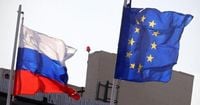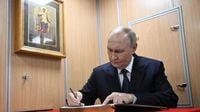In a bold assertion of military confidence, Russian President Vladimir Putin declared that his forces not only possess the initiative on the battlefield but are also poised to completely defeat the Ukrainian Armed Forces (VSU). This declaration came during a meeting on March 27, 2025, with sailors aboard the nuclear submarine cruiser 'Arkhangelsk', as reported by the BBC.
Putin emphasized that his army is "steadily, but surely moving towards achieving its set goals." His remarks underscore a significant shift in rhetoric, as he has increasingly framed the conflict in Ukraine as one where the Russian military is in a dominant position.
In a continuation of his controversial narrative, Putin reiterated his stance that all power in Ukraine is held by "nationalist formations" such as the Azov regiment. This assertion reflects his ongoing strategy of delegitimizing the Ukrainian government, which he now claims is not just President Volodymyr Zelensky, but the entire Ukrainian administration.
During the meeting, Putin also raised the prospect of establishing a temporary government in Ukraine, which he suggested could facilitate peace negotiations. He referenced historical precedents from East Timor, New Guinea, and Yugoslavia, where temporary governments were formed to stabilize regions before moving towards peace.
Putin's rhetoric has evolved since January 2025, when he only questioned the legitimacy of Zelensky. Now, he has expanded his claims to encompass the entirety of the Ukrainian government. This shift came after he suggested that if elections were held in Ukraine, General Valerii Zaluzhny would emerge victorious—a statement that further complicates the narrative surrounding Ukraine's political landscape.
Experts have noted that Putin's recent speech marks a new phase in his demands to the West. Following his calls for the reinstatement of certain Russian banks into the SWIFT system, analysts from Bloomberg have speculated that the Kremlin may leverage the ongoing negotiation process in Er-Riyad to extract further concessions from Washington.
Putin’s insistence on the illegitimacy of the current Ukrainian government raises significant concerns. He pointedly remarked that the Kremlin is unwilling to sign any agreements with the existing leadership, fearing that a change in power could render such agreements void. Instead, he proposed that only after a temporary government is established and presidential elections are conducted could meaningful discussions about a peace treaty take place.
This strategy appears to be part of a larger pattern of behavior from the Kremlin, which has been accused of violating 190 international agreements throughout the course of the conflict. These violations have drawn widespread condemnation from the international community, further isolating Russia on the world stage.
Despite Putin's assertions of military success, the reality on the ground remains complex. The ongoing conflict has seen fluctuating fortunes for both sides, with Ukrainian forces continuing to mount resistance against the Russian incursion. The West, particularly the United States and its allies, have remained steadfast in their support for Ukraine, providing military and humanitarian aid in response to Russia's aggression.
As the situation evolves, the international community watches closely. The implications of Putin's remarks extend beyond the battlefield, as they signal a potential shift in diplomatic approaches to resolving the conflict. The insistence on a temporary government reflects a desire to reshape the political landscape in Ukraine according to Moscow's interests, which raises questions about the sovereignty and future of the nation.
Moreover, the Kremlin's call for concessions from the West could lead to further tensions in international relations, particularly as the U.S. and European nations navigate their responses to Russia's demands. The balance of power in the region continues to be precarious, with each development potentially altering the course of the conflict.
In summary, Putin's recent statements underscore a significant escalation in rhetoric and demands regarding Ukraine. His claims of military initiative and calls for a temporary government reflect a strategy aimed at undermining the legitimacy of Ukraine's current leadership while seeking to negotiate from a position of strength. As the world watches, the unfolding events will undoubtedly shape the geopolitical landscape for years to come.





